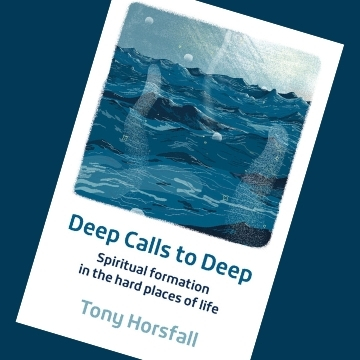In his book Deep Calls to Deep Tony Horsfall explores those psalms written ‘from the depths’. First published in 2015, the recent new edition is timely, as Tony explains in this edited extract…
13 June 2021
Passing through the valley
In the first edition of Deep Calls to Deep, I wrote that while the book would have immediate relevance for some, for others it would provide wisdom for future reference, ‘for no one knows what the future may bring’. Little did I know how relevant the message of this book would be in 2021, as the world continues to respond to the waves and breakers of a global pandemic.
Back then I invited friends to share their stories of crying out to God from the depths, so as to anchor the book’s teaching in the lived experience of ordinary people. Now, as I’ve written in these pages before, I too have plumbed the depths of those deep places, needing to apply to myself the truths shared in this book.
The message of Deep Calls to Deep is that God meets us in the deep places of life, in our suffering and loss and confusion, and invites us into a deeper relationship with himself. It is in these hard places that God’s work of transformation takes place most effectively. The book of Psalms, with the raw honesty of its songs of lament, is the place where we can find resonance for our experience and comfort for our souls.
‘With the raw honesty of its songs of lament, Psalms is where we can find resonance for our experience and comfort for our souls.’
I discovered the Psalms in 2011
I say ‘discovered’, not meaning that I was previously unaware of this much-loved book of the Bible, but that until then I knew only individual psalms and not the book itself. Like most people, I had my favourite psalms, which I turned to again and again.
All that changed for me when, as part of the celebration of the 400th anniversary of the King James Bible, we were encouraged in church to read through the Bible in a year. I was aware of some gaps in my Bible knowledge as well as the fact that over time I had neglected certain portions of scripture. So I decided to start my reading programme with the books I tended to overlook.
I began with Ezekiel and quickly realised why I had neglected it for so long. However, I dutifully finished reading the 48 (rather long) chapters and then, for light relief, turned to the book of Psalms.
This new encounter with the book of Psalms had such an impact on me that, instead of leaving them behind and moving on to other, less familiar parts of the Bible, I decided to linger there and read them again. I felt I wanted to drink deeply of the life of God that is communicated to us through these inspired and beautiful words.
‘I wanted to drink deeply of the life of God that is communicated to us through these inspired and beautiful words.’
Entering the sanctuary
It seems to me that the book of Psalms, when taken as a whole, provides us with a wonderful handbook for spiritual formation. Here we see life with God as it really is. True, there is a certain distance between us and the psalms – historically, geographically, culturally and even theologically, as they reflect the old covenant between God and his people. They are both familiar and foreign to us, yet they continue to speak deeply to us about our relationship with God. As one Old Testament professor puts it: ‘As we read the Psalms, we are entering into the sanctuary, the place where God meets men and women in a special way.’ The Psalms are a kind of literary sanctuary in the scripture, the place where God meets his people and where his people may address him with their praise and lament.
It was this intimacy with God, this raw honesty with him, that drew me to the Psalms in a fresh way. As we read them, we can make the words our own, enter into the experience of the writer and find our own voice before God. In particular, I was drawn to the songs of lament, prayers that come from a deep place and reflect the struggle to understand what God is doing in our lives.
‘The Psalms are both familiar and foreign to us, yet they continue to speak deeply to us about our relationship with God.’
One of the expressions in the book of Psalms that caught my attention is the rather enigmatic phrase ‘deep calls to deep’ (Psalm 42:7). I am not a Hebrew scholar, and it seems that even scholars find it difficult to translate and explain the meaning of these words, but I understand them to be saying that in the deep experiences of our lives, God invites us into a deeper relationship with himself. I believe that the book of Psalms can help us not only to make some sense of the difficult times in our lives, but also to work our way through them, so that we are drawn closer to God and our faith is deepened, not weakened.
Read Tony’s previous articles ‘Love and loss ina time of lockdown’ and ‘A life of service’.

People around the world have been inspired and refreshed by Tony Horsfall’s teaching and mentoring. As well as working as an international freelance trainer and retreat leader, he has written a number of other books for BRF and also contributes to New Daylight Bible reading notes.

Through looking at some of the Psalms written ‘from the depths’ we can understand more fully the way God works to shape our characters and form the life of Christ within us during difficult times in life. This will enable us not only to make sense of our own history with God, but also help us to get to know God here and now, and prepare us for what may lie ahead.
